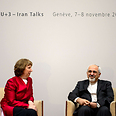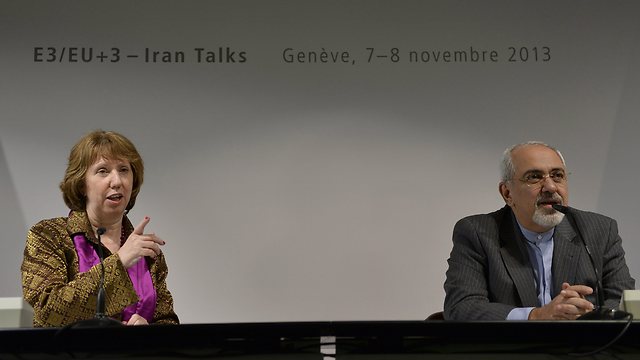
Western diplomat: More time needed on Iran nuclear deal
Top diplomat says talks with Iran have yet to fail, despite lack of breakthrough. British FM says interim deal will include limited sanctions relief
There was "no breakthrough yet but definitely no failure," said the diplomat on condition of anonymity, speaking after the negotiations between Iran and P5+1 powers – Britain, France, the United States, Russia and China plus Germany.
Related stories:
- Kerry to Netanyahu: Oppose deal only after you see it
- Ya'alon: Rohani elected to be Iran's 'pretty face'
- Britain revives ties with Iran
"The collective assessment of the group was that some more time would still be needed; that was not just the assessment of the French," the source added, referring to reports in some quarters blaming France for holding up a deal.
The talks were "very intensive, very complex, very detailed and constructive," the diplomat added, saying that an agreement to return to the negotiating table as early as next week "shows how serious we are."
It was "crucial to keep momentum," the source said.
In the latest marathon round of the years-long talks, hopes of finally reaching a deal soared after foreign ministers from the P5+1 powers rushed to the Swiss city to join the meeting at the weekend.
When it ended inconclusively some laid the blame on France, whose Foreign Minister Laurent Fabius raised concerns over a heavy water reactor being built at Arak, an issue which was introduced into the negotiations recently by global powers.
Meawhile, Britain's Foreign Secretary William Hague said world powers would lift some of the sanctions they have imposed on Iran if a preliminary deal over its nuclear program could be reached.
"An interim agreement would involve offering Iran limited, proportionate sanctions relief," Hague told the British parliament, reiterating that a "deal is on the table ... and can be reached".
Britain wanted an interim agreement with Iran as a first step towards a full deal on Tehran's disputed nuclear program, he added, in an update to lawmakers. Despite reports to the contrary, he said world powers had a united stance in talks with Iran at the weekend and that no one country had vetoed a deal.
Speaking Monday in Abu Dhabi, US Secretary of State John Kerry accused Iran of walking away from a deal at the Geneva talks.
"The P5+1 was unified on Saturday when we presented our proposal to the Iranians... But Iran couldn't take it, at that particular moment they weren't able to accept," said Kerry.
Against the backdrop of deep disagreement between Israel and the United States regarding a possible nuclear deal with Iran, Defense Minister Moshe Ya'alon warned Monday of complacency. "We believe that (Iranian President Hassan) Rohani and his foreign minister know how to deceive and manipulate – and have been so far successful," said Ya'alon at the Jewish Federations of North American General Assembly, which is held in Jerusalem.
Noam (Dabul) Dvir and Reuters contributed to this report
- Receive Ynetnews updates directly to your desktop











